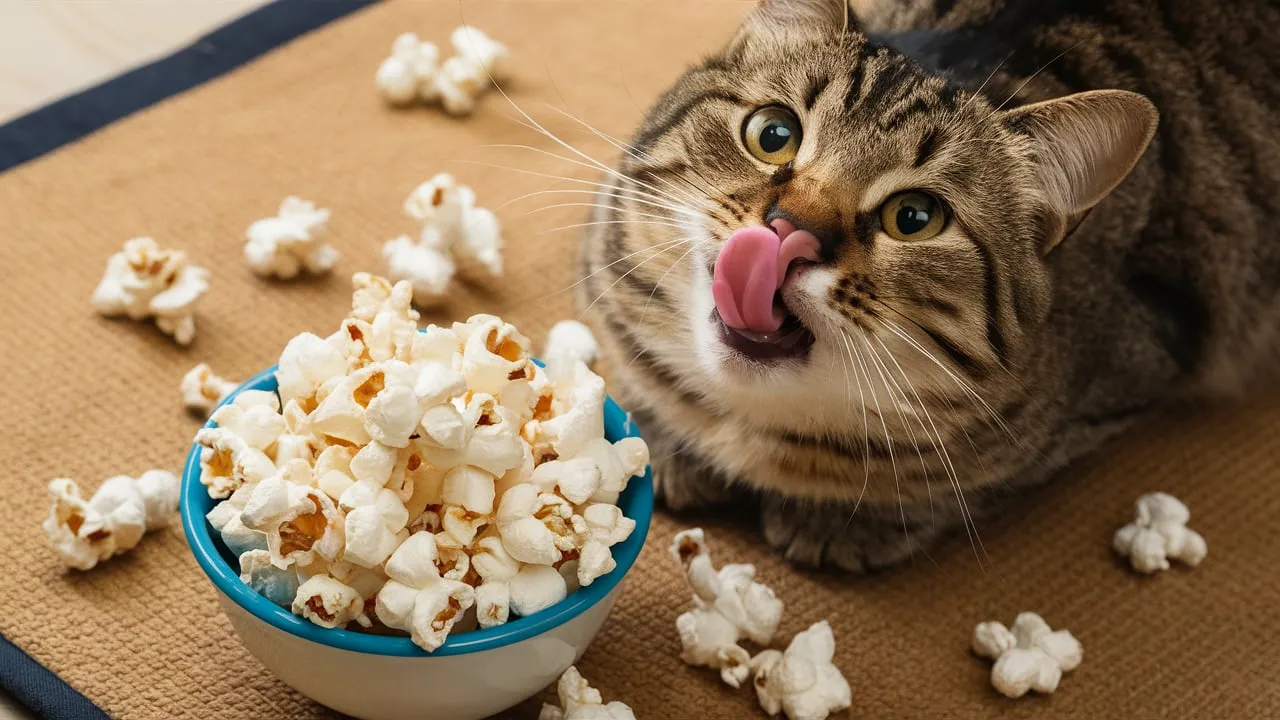Curled up on the couch, engrossed in your favorite show, you reach for a handful of popcorn – that perfect movie-night companion, light and satisfying. It’s a guilt-free snack, boasting surprising health benefits and keeping hunger pangs at bay before dinner. But as you reach for another handful, a few stray kernels tumble to the floor. Your feline companion, ever the curious and opportunistic creature, darts in to snatch a piece. This begs the question: is popcorn a harmless treat for your cat, or will it cause a tummy ache? The answer, like with many things related to feline nutrition, is not a simple yes or no. Cats, after all, process food differently than humans, and some of our everyday foods can have unintended side effects on their sensitive digestive systems. However, the good news is that many human foods are not only non-toxic but can even be beneficial additions to a cat’s diet, popcorn potentially included. Let’s delve into the world of feline snacking and explore whether popcorn is a purr-fectly safe treat for your furry friend.
Health Benefits Of Popcorn
Beyond its delightful taste and movie-night appeal, popcorn offers a surprising bounty of health benefits for humans. Nutritionists hail it as a whole grain superstar, brimming with goodness for our bodies. One of the best sources of fiber you can find, popcorn also boasts a wealth of vitamins like B1, B3, and B6, alongside essential minerals such as zinc, magnesium, and potassium. But the benefits don’t stop there. Popcorn packs a powerful punch of polyphenol antioxidants, linked to improved circulation, better digestion, and even a reduced risk of certain cancers like prostate and breast cancer. What makes popcorn particularly unique is its concentration of these antioxidants. Unlike fruits and vegetables where polyphenols can be diluted by water content, popcorn’s mere 4% water content means you’re getting a concentrated dose of this cancer-fighting compound. So, the next time you reach for a handful of popcorn, remember – you’re not just indulging in a tasty treat, you’re giving your body a healthy boost.
Can Cats Eat Popcorn?

The question of popcorn and feline consumption is a bit of a two-sided coin. On the one hand, plain popcorn itself isn’t toxic to cats. It appears on the ASPCA’s safe list. However, the answer becomes more complex when we consider the popcorn we typically enjoy. Butter and salt, common popcorn companions for humans, can create a multitude of health problems for cats. Unlike us omnivores, cats are obligate carnivores, meaning their digestive systems aren’t equipped to handle grains effectively. As Dr. Gary Richter, a veterinarian, points out, cats have no real nutritional need for carbohydrates. While small amounts might be okay in a balanced diet, they should be minimal. Another hurdle is pre-packaged, microwaveable popcorn. This convenient snack option often contains perfluorooctanoic acid (also known as PFOA), a chemical linked to ADHD and thyroid issues in humans. These microwaveable bags frequently boast artificial butter flavoring, which can be dangerous for cats as well. Diacetyl, a chemical found in artificial butter, has been shown to cause lung disease in animals if inhaled. So, while plain popcorn might not be inherently harmful, the butter, salt, and artificial ingredients commonly associated with it can pose significant health risks for your feline friend.
Can Cats Eat Corn?
The verdict on corn for cats mirrors that of popcorn: keep it plain! Skip the butter and salt-laden varieties, as these are a definite no-no for your feline friend. However, cats are attracted to certain textures, and according to PetMD, whole grains like corn, in small doses and minimally processed forms like cornmeal, polenta, oats, barley, and even wholewheat breadcrumbs, can be a digestive-friendly option with some nutritional value. The key is to ensure these grains are fully cooked, making them easier for your cat to break down. Remember, a balanced cat food rich in animal protein should always be the foundation of your cat’s diet. These occasional, grain-based treats should only be offered in moderation to complement their primary source of nutrition.
Alternative Healthy Snacks
While popcorn and corn might seem like tempting treats to share with your feline friend during movie night, it’s best to explore healthier alternatives. Dr. Richter, a veterinarian, suggests looking beyond traditional treats and venturing into the world of vegetables. The ASPCA assures us that a variety of veggies, from crunchy celery to vitamin-rich spinach, are perfectly safe for cats and can even provide valuable nutrients as part of a balanced diet. Experimenting with these healthy options can be a fun way to bond with your cat. However, remember that popcorn, corn, and even these vegetables should never be a meal replacement. Cats are obligate carnivores, and their primary source of nutrition should always be a high-quality cat food formulated to meet their specific needs. So, the next time you’re enjoying a snack, offer a safe and enriching vegetable instead – your cat might just surprise you and become a veggie enthusiast!
Conclusion
We hope with information of Infor Cats, you can understanding about can cats eat popcorn. While plain popcorn itself isn’t toxic to cats, it’s best to avoid sharing it with your feline friend. Popcorn kernels can pose a choking hazard, and the butter, salt, and artificial ingredients commonly added to popcorn can lead to digestive issues and other health problems for cats.

Related Post
What Is Carrageenan In Cat Food?
6 Types Of Ingredients To Avoid In Cat Food
Is It Bad For Cats To Eat Dog Food? What You Need To Know